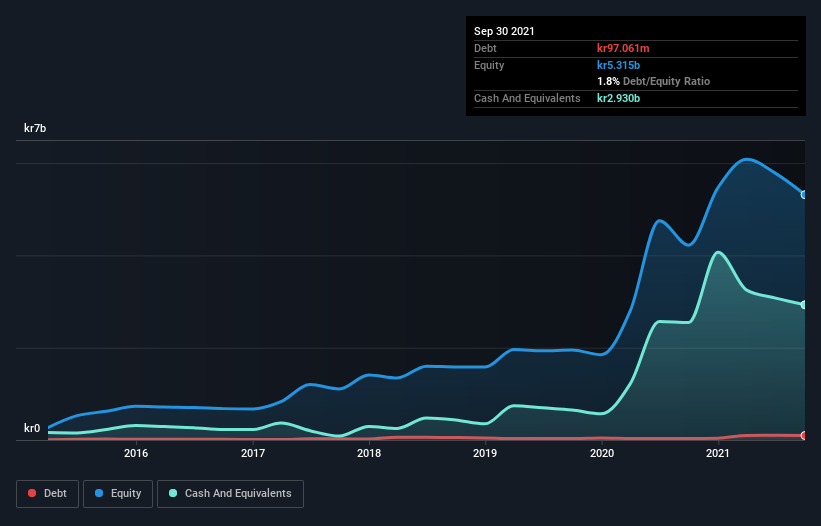
Some say volatility, rather than debt, is the best way to think about risk as an investor, but Warren Buffett famously said that 'Volatility is far from synonymous with risk.' So it seems the smart money knows that debt - which is usually involved in bankruptcies - is a very important factor, when you assess how risky a company is. We can see that Nel ASA (OB:NEL) does use debt in its business. But the real question is whether this debt is making the company risky.
Why Does Debt Bring Risk?
Debt assists a business until the business has trouble paying it off, either with new capital or with free cash flow. Ultimately, if the company can't fulfill its legal obligations to repay debt, shareholders could walk away with nothing. However, a more common (but still painful) scenario is that it has to raise new equity capital at a low price, thus permanently diluting shareholders. Having said that, the most common situation is where a company manages its debt reasonably well - and to its own advantage. The first step when considering a company's debt levels is to consider its cash and debt together.
View our latest analysis for Nel
What Is Nel's Debt?
The image below, which you can click on for greater detail, shows that at September 2021 Nel had debt of kr97.1m, up from kr32.7m in one year. But it also has kr2.93b in cash to offset that, meaning it has kr2.83b net cash.

How Strong Is Nel's Balance Sheet?
We can see from the most recent balance sheet that Nel had liabilities of kr506.2m falling due within a year, and liabilities of kr225.6m due beyond that. Offsetting these obligations, it had cash of kr2.93b as well as receivables valued at kr231.9m due within 12 months. So it actually has kr2.43b more liquid assets than total liabilities.
This short term liquidity is a sign that Nel could probably pay off its debt with ease, as its balance sheet is far from stretched. Simply put, the fact that Nel has more cash than debt is arguably a good indication that it can manage its debt safely. The balance sheet is clearly the area to focus on when you are analysing debt. But it is future earnings, more than anything, that will determine Nel's ability to maintain a healthy balance sheet going forward. So if you want to see what the professionals think, you might find this free report on analyst profit forecasts to be interesting.
In the last year Nel wasn't profitable at an EBIT level, but managed to grow its revenue by 40%, to kr723m. With any luck the company will be able to grow its way to profitability.
So How Risky Is Nel?
By their very nature companies that are losing money are more risky than those with a long history of profitability. And we do note that Nel had an earnings before interest and tax (EBIT) loss, over the last year. And over the same period it saw negative free cash outflow of kr817m and booked a kr102m accounting loss. While this does make the company a bit risky, it's important to remember it has net cash of kr2.83b. That kitty means the company can keep spending for growth for at least two years, at current rates. With very solid revenue growth in the last year, Nel may be on a path to profitability. Pre-profit companies are often risky, but they can also offer great rewards. There's no doubt that we learn most about debt from the balance sheet. However, not all investment risk resides within the balance sheet - far from it. For example - Nel has 3 warning signs we think you should be aware of.
If you're interested in investing in businesses that can grow profits without the burden of debt, then check out this free list of growing businesses that have net cash on the balance sheet.
Valuation is complex, but we're here to simplify it.
Discover if Nel might be undervalued or overvalued with our detailed analysis, featuring fair value estimates, potential risks, dividends, insider trades, and its financial condition.
Access Free AnalysisHave feedback on this article? Concerned about the content? Get in touch with us directly. Alternatively, email editorial-team (at) simplywallst.com.
This article by Simply Wall St is general in nature. We provide commentary based on historical data and analyst forecasts only using an unbiased methodology and our articles are not intended to be financial advice. It does not constitute a recommendation to buy or sell any stock, and does not take account of your objectives, or your financial situation. We aim to bring you long-term focused analysis driven by fundamental data. Note that our analysis may not factor in the latest price-sensitive company announcements or qualitative material. Simply Wall St has no position in any stocks mentioned.
About OB:NEL
Nel
A hydrogen company, provides solutions to produce, store, and distribute hydrogen from renewable energy in Norway and internationally.
Flawless balance sheet with limited growth.
Similar Companies
Market Insights
Community Narratives




